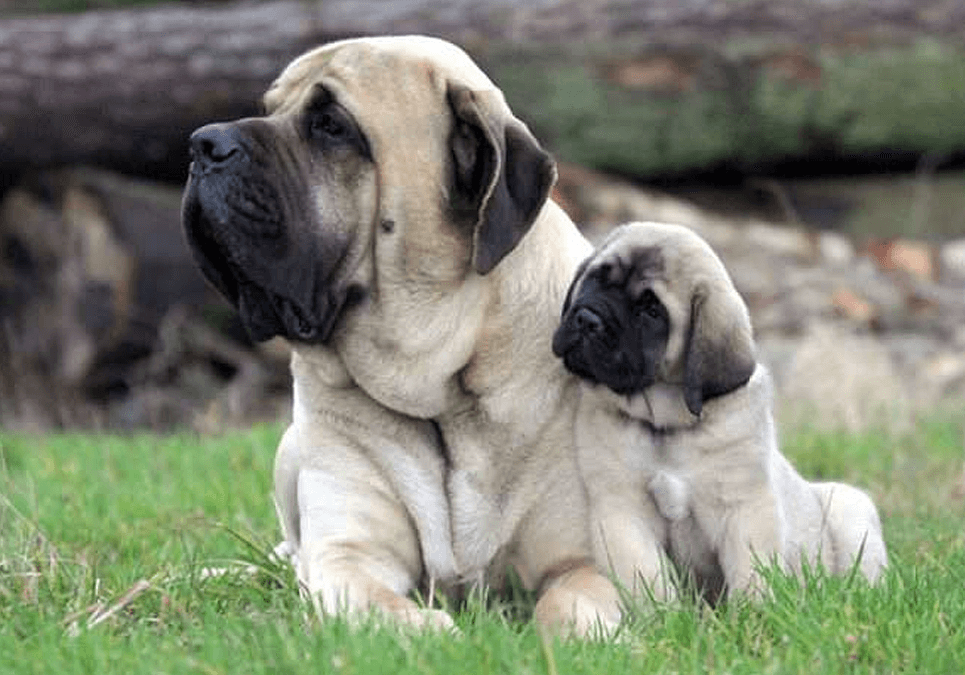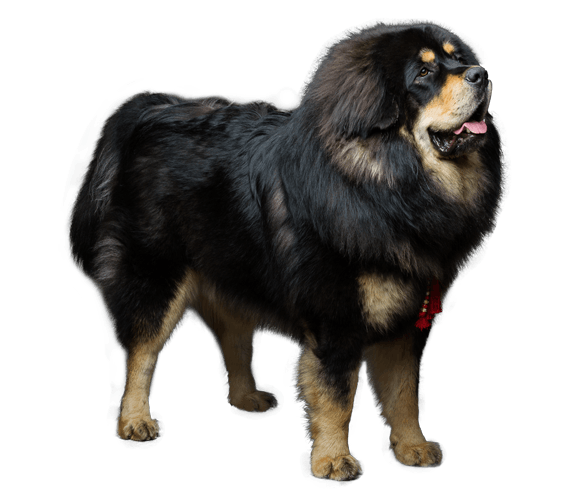There are many varieties of mastiffs. Each has distinct history and particularities. Here are a few of the most well-known mastiff breeds. English Mastiff - The English Mastiff has a history of over 2,000 year. They are loved for their size and the gentle, affectionate nature of their temperament.
Bullmastiff: The Bullmastiff was first introduced in England in 1899, as a protection dog against poachers. These massive and powerful dogs are known for their devotion, protective instincts, and strength.
Neapolitan MastiffNeapolitan Mastiff - The Neapolitan Mastiff is an ancient breed of dog that was developed in Italy. They are renowned for their loose, wrinkled, and saggy appearance, and their loyal and protective nature.
Tibetan Mastiff: The Tibetan Mastiff is an ancient breed, is employed to guard and protect herds, flocks and villages in Tibet and throughout Asia. They are renowned for being robust and large and also for their protection instincts.
Spanish Mastiff - The Spanish Mastiff is a massive, powerful breed that was created in Spain as a livestock guardian. They are known for their bravery and loyalty, as well as their ability to work on their own in remote areas.
Dogue de Bordeaux- The Dogue de Bordeaux, also known as the French Mastiff, is a huge breed of dog that was born in France. They are known for their huge size, robust build, loyal and protective nature.
Each of these breeds each one has its own distinct traits and traits of personality, so it's important to do your research and select a breed that is well-suited to your lifestyle and personality. Have a look at the top rated best mastiff breeds ideas for blog recommendations.

When Do Mastiff Puppies Lose Their Teeth And Stop Growing?
Mastiffs are larger breeds and have a longer growing period than smaller breeds. Mastiff puppies stop growing between 18-24 months of age. However, they may increase in size and weight until about 3-4years old. Mastiff puppies are quick to grow and can grow up to 5 lbs every week during the first year of their life. When they reach six to eight months old, they could have already reached their full adult size, but they will continue to gain weight and grow out as they get older. It's crucial to watch the development and growth of Mastiff puppies carefully and ensure that they get the proper nutrition and exercise to support their growth. To prevent health problems, it is essential to speak with an experienced breeder and veterinarian to design a diet which meets the puppy's needs for nutrition. In short, Mastiff puppies generally stop growing in height between 18-24 months, however they may remain full and gain weight until they are approximately 3-4 years old.
Mastiff puppies lose their infant teeth, just like the rest of puppies. As they grow older, Mastiff puppies also develop permanent teeth. Teething refers to the process of developing permanent teeth and losing baby teeth. It usually starts around 3-4 months old. Mastiff puppies may experience discomfort and pain during teething. Their baby teeth be removed and the adult teeth will come in. This discomfort can be relieved by them chewing on toys, furniture or other items. Mastiff puppies usually lose their front incisors, then their canine teeth, and then their premolars, molars, and finally their canine teeth. When they reach the age of 7-8 months and have lost all their permanent teeth are lost. Mastiff puppies will require numerous chew toys and toys to assist them through the process of teething. It's important to inspect their gums and teeth for signs of infection. A vet will be able to ensure that they get adequate dental care throughout their life. Take a look at the top dog with stretchy skin for blog advice.

What Are The Personality Traits And Traits Of Kangal A Turkish Mastiff?
The Kangal often referred to as the Turkish Mastiff or Kangal is a strong and large breed that originated from Turkey. These are the typical traits and traits of personality that the Kangal exhibits. Size- The Kangal is large. Males can be at least 30 inches tall at their shoulders and weigh between 110 and 150 pounds. Females are slightly smaller, standing 28 to 30 inches tall, and weighing 90-120 pounds.
Appearance: The Kangal has a thick, short coat that can vary from black to gray, from gray and grey. They generally have a black head and chest, with an area of white around their chest.
Temperament: The Kangal is a loyal and protective breed that is well-known for their bravery and their intelligence. Although they're independent thinkers, they can also be sometimes stubborn. However they are generally friendly and kind to their families.
Protectiveness - The Kangal is born to be a livestock protector. They are well-known for their protection instincts. They're loyal to their family and will fight for them in the event that they face danger.
Kangals are a breed that can be trained. However, they can sometimes be stubborn and independent. Training and socialization are crucial in helping them learn an understanding of other animals, and to learn how to communicate with humans.
Fitness requirements- The Kangal is an active breed that requires regular exercise in order to stay healthy and content. They are a fan of long walks in the sun and are a fan of the outdoors. However they are also happy with moderate exercise.
Health concerns- As with all breeds, the Kangal is susceptible to specific health issues, such as hip dysplasia, elbow dysplasia, bloat and eye problems. These problems can be prevented and identified through regular veterinary tests and screenings. Kangals are susceptible to hip dysplasia (elbow dysplasia), and eye problems like entropion. This breed could also suffer from heart conditions like aortic Steening and Dilated Cardiomyopathy.
Regular health screenings by an experienced veterinarian are recommended for Kangals in order to look for any of these ailments. This includes assessments of the elbow and hips along with eye exams and cardiac evaluations. Screenings are a good method of identifying possible health problems and enable early treatment. Have a look at the top rated helpful site about Kangal Turkish Mastiff breed for site tips.

What Do Fila Brasileiros (Brazilian Mastiffs), Eat, And How Many Times?
Fila Brasileiro (Brazilian Mastiff), requires a high-quality, balanced diet. Fila Brasileiros are big and require a high-quality diet with balanced nutrition. The frequency and quantity of meals Fila Brasileiro pets are fed will depend on their age, weight, activity level and overall health. Fila Brasileiro adult dogs need to be fed at least two meals a day and puppies may need to be fed more frequently.
Fila Brasileiros may become overweight and develop health problems because of their excessive eating. It is essential for pet owners to be aware of the dog's weight, and to adjust their diet as necessary, in order to keep them healthy. It is crucial that pet owners provide water for their dog at all times. Follow the recommended visit this Fila Brasileiro Brazilian Mastiff breed for site advice.
[img]https://www.rd.com/wp-content/uploads/2021/06/dog-breeds-zodiac.jpg?fit\u003d700,1024[/img]
What Are The Most Common Health Issues For Dogs? Argentino And How Often Should You Check?
Dogo Argentinos could be susceptible to health problems like all dogs. Deafness is a possibility for some Dogo Argentinos to be born deaf, or develop deafness over time. Hearing tests on a regular basis can help identify early hearing problems.
Hip dysplasia is an illness that is genetic in nature. It occurs when the hip joint fails to develop properly, which causes pain, lameness, and arthritis. The X-ray can screen for hip dysplasia at the age of 12 months.
Elbow dysplasia is an illness in which the elbow joint fails to develop as it should. It can cause arthritis, pain, lameness and lameness. The screening for elbow dysplasia could be carried out using X-rays. The screening is possible as early as 12 months old.
Skin allergies: Dogo Argentinos could be susceptible to allergies that can cause skin itching, hair fall, as well as skin infections. Regular examinations of the skin can help to identify issues quickly.
Heart diseases- Certain Dogo Argentinos might be susceptible to certain heart ailments like dilated cardiomyopathy. Regular cardiac checks will help detect any issues early.
Regular veterinary examinations are essential for you Dogo Argentino. These may also include screening for health issues. Your dog's age and general health can affect the frequency of check-ups and screenings. It is best to consult your vet regarding the most appropriate schedule. Adult dogs should be examined at least every 6-12 months. See the top Dogo Argentino breed for more tips. Read more Top Reasons When Picking The Best Mastiff Msftip 354b327
